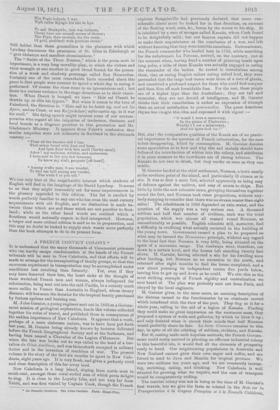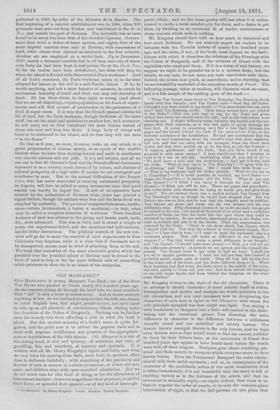A FRENCH CONVICT COLONY.*
IT is understood that the many thousands of Communist prisoners who can hardly escape condemnation at the hands of the French tribunals will be sent to New Caledonia, and that efforts will be made to arrange for the transplanting of family groups, so that this enormous experiment in transportation may be accomplished under
conditions leas revolting than formerly. Yet, even if they may have deserved their fate, the heart sinks at the thought of these wretched French men and women, always indisposed for colonization, being sent out into the mid-Pacific, to a country much more unlike to France than Australia to England, whose dreary distance will but seem the drearier for the tropical beauty purchased by furious cyclone and burning sun.
M. Jules Gamier, a young engineer sent out in 1863 on a Govern- ment mission of geological exploration, has in this volume collected together his notes of travel, and published them in consequence of the sudden importance of New Caledonia. It appears that a work, perhaps of a more elaborate nature, was to have been put forth last year, M. Gamier being already known by lectures delivered before the French Geographical Society and at the Sorbonne, and having been named a Chevalier of the Legion d'Honneur. But when the late war broke out he was called to the head of a bat- talion du Genie ilusiliare, and was thenceforth occupied in military duties and in the invention of machines of war. The preseut volume is the story of the first six months he spent in New Cale- donia, eight years ago. It is very fresh, and gives a perfectly vivid and clear description of this far-away land.
New Caledonia is a long island, sloping from north-west to south-east, amongst those coral-reefed seas of which poets delight to sing. It is close to the Loyalty Isles, and not very far from Tahiti, and was first visited by Captain Cook, though the French
• La Nouvelle CaleVonie. Par Jules Gamier. Paris : Henri Pion. explorer Bougainville had previously declared that some con- siderable island must be looked for in that direction, on account of the floating wood, nuts, &c., borne by the waves to his ship. It is inhabited by a race of savages called Kanaks, whom Cook found to be delightfully mild ; but our famous captain did not happen to make their acquaintance at the conclusion of a war, and left without knowing that they were horrible cannibals. Eutrecasteaux, the French commander who landed here in 1792, while searching for the unfortunate La Perouse, arrived, on the contrary, just at the moment when, having fixed a number of grinning heads upon long poles, a tribe of those Kanaks was actually engaged in eating the remainder of the bodies. So rooted is cannibalism among them, that on seeing English sailors eating salted Lief, they were persuaded that the largo beef-bones were those of a race of giants, and conceived a profound respect for those who could first conquer and then dine off such formidable foes. For the rest, these people are of a higher typo than the Australians ; they are tall and muscular, they are not devoid of intelligence, and M. Gamier thinks that their cannibalism is rather an expression of triumph than an actual satisfaction to gourniandize. The queer American rhyme has caught this idea and expressed it with vigour : —
" 0 would I were a cassowary, In the plains of Timbuotoo ; Wouldn't I eat a missionary, And his hymn-book too I"
But, alas! the comparative qualities of the Kauak are of no practi- cal importance to the question of French colonization, for the race is fast disappearing, killed by consumption. M. Garuier devotes some speculation as to how and why this sad malady should have followed the introduction of whites into the colony, and attributes it in some measure to the inordinate use of strong tobacco. The Kanaks do not care to drink, but they smoke as soon as they can toddle.
M. Gamier landed at the chief settlement, Noumea, a town nearly at the southern point of the island, and particularly ill chosen as to.
site. It was at first a mere fort, selected apparently as being easy of defence against the natives, and easy of access to ships. .But. little by little the new colonists came, grouping themselves together
round the fort, and Noumea took other proportions, without any- body atoppiug to consider that there was no stream nearer than eight miles l The inhabitants in 1863 depended on rain-water, and the question of the supply was a very serious one. A thousand soldiers and half that number of civilians, ouch was the total population, which was almost all massed round Noumea, as uncomfortably as possible. English colonists will, moreover, find a difficulty in crediting what actually occurred in the building of the young town. Government caused a plan to be prepared on what may be termed the Hausmann principle, without any regard to the local fact that Noumea is very hilly, being situated on the spurs of a mountain range. The roadways were, therefore, cut down to a certain level, and the houses left standing twenty feet above. M. Gamier, having selected a site for his dwelling soon after landing, left Noumea on an excursion to the north, and returned after eight months to find the house completed, and a new street pursuing its independent course five yards below, leaving him to get up and down as he could. We cite this as the most striking example of French rigidity and centralization we ever heard of. The plan was probably sent out from Paris, and obeyed by the local engineers.
M. Gamier gives, in the same sense, an amusing description of the distress caused to the functionaries by an obstinate mound which interfered with the view of the port. They dug at it for a whole year, calling iu the aid of a legion of Kanaks. Finding they could make no groat impression on the enormous mass, they proposed a system of wells and galleries, by which to blow it up ; and only desisted when it struck their minds that half Noumea would probably share its fate. La butte Conneau remains to this. day, in spite of all the nibbling of soldiers, civilians, and Kauaks.
But if, casting aside such hopeless methods, the French Govern- ment could really succeed in planting an efficient industrial colony in this beautiful isle, it would find all the elements of prosperity ready to hand. Our neighbouring populations in Australia and New Zealand cannot grow their own sugar and coffee, and are forced to send to Java and Manilla for tropical produce. We were two millions ten years ago, and we are constantly increas- ing, enriching, eating, and drinking. New Caledonia is well situated for growing what we require, and the cost of transport would be comparatively trifling.
The convict colony was not in being at the time of M. Gamier's. first travels, but we give the facts as related in the Note MU' in Transportation a la Guyane Frangaise et a la Nouvelle Cationic published in 1869, by order of the Ministre de la Marine. The first beginning of a convict establishment was in 1864, when 200 prisoners were sent out from Toulon and established in the Ile de Non, just outside the port of Noumea. The mortality was at once found to be much less than that of the dreaded Cayenne. Govern- ment then tried a ticket-of-leave system, and eighty-four of the most hopeful convicts were sent to Bouraie, with concessions of land, while others were allotted as assistants to the free colonist. Another set are employed on a model farm. Up to December, 1867, nearly a thousand convicts had in all been sent out, of whom only forty-six had been kept in real prison life at the Ile de Non. So far the results have been satisfactory, but what will they be when the island is flooded with discontented Paris workmen ? And of all God's creatures, the Paris workman seems to us the least adapted for labour on the soil in a mid-Pacific island. If he be 'worth anything, and not a mere haunter of cabarets, he excels by mechanical dexterity of hand and what one may call dexterity of head. He has ideas which, be they right or wrong (and about this we are all disputing), require population as the basis of experi. ments, and will find no sort of satisfaction in the possession of a field of sugar-canes. It is true that the French peasant adores his bit of land, but the Paris workman, though doubtless of the same stuff, has set his mind and ambition to another key, and, moreover, he will carry out to New Caledonia the most vicious hatred of those who sent and keep him there. A large body of troops will have to be stationed in the island, and we fear they will not have 4'
Is vie douce."
Be that as it may, we must, it seems, make up our minds to a great perpetuation of human misery, at an epoch of the world's history when we have been moving heaven and earth to ameliorate our convict colonies and our jails. It is a sad subject, and all we can say is that M. Garnier's book and the French official documents represent to us a country much favoured by nature, and chances of colonial prosperity of a high order if nature be not corrupted and overborne by man. But to the normal difficulties of the French colon, who has never succeeded in creating substantial prosperity in Algeria, will here be added so many extraneous ones that good results can hardly be hoped for. •A sort of co-operative farm .created by the authorities of Noumea some years ago proved a signal failure, though the settlers were free and the farm stock was supplied by authority. The per 8onnel comprised labourers, smiths, stone-cutters, brickmakers, a baker, a machinist,—in fact, what may be called a complete selection of workmen. Three hundred hectares of laud was allotted to the group, and beasts, seeds, tools, Scc., were advanced. This was in 1864, and in about a couple of years the experiment failed, and the members had split asunder, amidst bitter dissensions. The political hatreds of the new con- victs will go far to make the renewal of such experiments in New Caledonia very hopeless, while it is clear that if thousands are to be transported, means must be tried of attaching them to the soil. We trust that somewhat of the same admirable genius which has presided over the youthful colony of Mettray may be found in the hour of need to help in the far more difficult task of reconciling -adult prisoners to their lot in an island of the antipodes.































 Previous page
Previous page